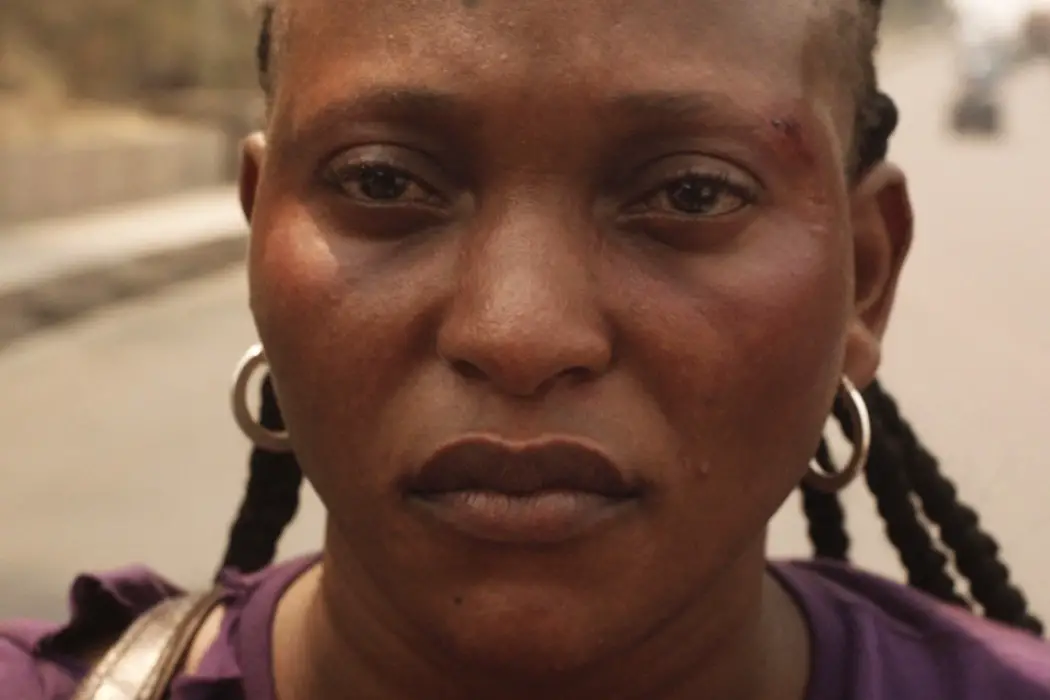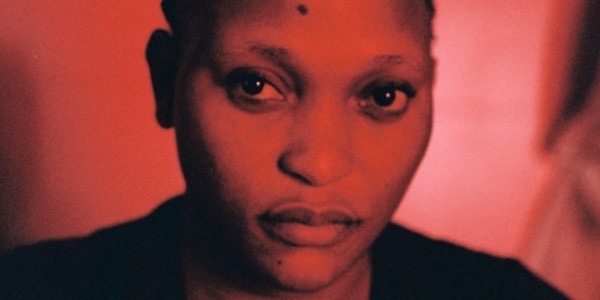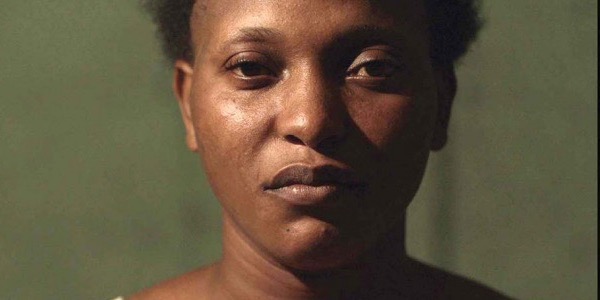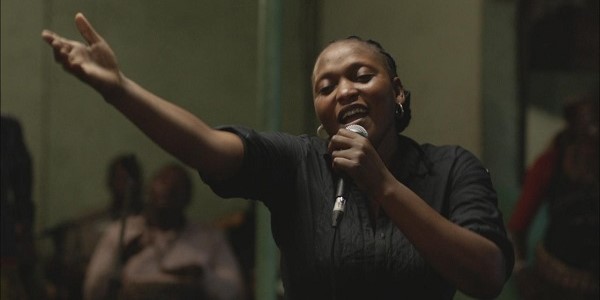FÉLICITÉ: Alain Gomis’s Paean To Ferocious Womanhood Is Fascinating But Frustrating

Lives by the sea in south-east England, with his wife,…
At the very beginning of Alain Gomis’s sporadically brilliant fourth film, Félicité, we see the titular character singing her heart out on stage in a packed Kinshasa nightclub. She appears free, joyous, loving every minute, as her backing band’s rhythms become ever more intense. Alas, Félicité’s reverie doesn’t last long. A fight breaks out, back at home her broken fridge soaks the floor, and when she receives a phone call from the hospital, you know it isn’t going to impart good news.
Félicité’s 14-year-old son, Samo (Gaetan Claudia), has been badly injured in a motorcycle accident and needs a costly operation to save his leg, which has sustained an open fracture. Initially, this is no financial problem for Félicité (played with gusto by newcomer Véro Tshanda Beya Mputu), a singer with a steady income from her gigs. However, when she is tricked out of a good chunk of her savings by a woman at the hospital, it jeopardises Samo’s future and forces her into a desperate mission to scrape together the rest of the money.
On a mission
This is very much a film of two distinct halves. The first is fast-paced, almost breathless, as Félicité throws herself into the quest for cash with zeal, approaching friends, employers, and even people she has never before laid eyes on, for contributions.

But proceedings slow perhaps a little too much at the halfway mark as she and Samo, plus Félicité’s sort-of boyfriend (Papi Mpaka‘s local drunk, Tabu), are forced to come to terms with the real consequences of Samo’s life-changing injury. Félicité doesn’t judder to a halt, but is a very different proposition after this point than it is before – increasingly reflective, morose, and prone to rather more of the strange fantasy/dream sequences which are threaded throughout the film.
Not broken, not bowed
Those scenes in which Félicité tries to raise funds are brutal – both physically and emotionally. She visits Samo’s father, from whom she is long-estranged, and he uses it as an opportunity for revenge (“You puffed out your chest. A strong woman!”). She visits an old friend of her mother’s (or possibly a relative – it isn’t made explicit), only to be asked by the woman: “How did you let yourself go like this? You used to be a presentable woman. How did you end up this ugly?” Despite her predicament, few seem willing to rally to Félicité’s cause, mostly because they are dirt-poor, but also because “standing on your own two feet” seems to be the credo of practically everyone she knows and meets.
The most powerful sequence in the film’s first half, though, comes when, seemingly out of options, Félicité heads off to Kinshasa’s well-to-do suburbs and knocks on the front gate of a rich local. Pushing her way past his housekeeper, she enters the man’s palatial home and entreats him to give her money, despite the fact he is a stranger. Affronted, he orders another employee to throw her out, and a fight ensues as Félicité continues to make her demands. It’s jaw-dropping, heartbreaking stuff, but even though Félicité is roughed up, she somehow retains her dignity. Afterwards, she sits on the pavement outside, straightening her ripped top and dabbing a wound on the side of her head with a tissue. Not broken, not bowed, with a few more precious Congolese francs in her pocket.
A ferocious woman
Beya brings gravitas to the role, her Félicité has clearly been a fighter her entire life, and she exudes attitude, determination, and strength. Every battle she’s fought is etched into the contours of her face, which we see in imperfect close-ups a lot of the time. Often her expression is blank, yet you are never in any doubt which emotions are boiling away beneath the surface. She raises the money she needs, not by begging, but straight-up demanding from those she feels owe her or have plenty to go around. This is a ferocious woman fighting for her son with all the strength she can muster.

Her performance is enhanced by Gomis’s French DP, Céline Bozon, who delights in Beya’s sheer physicality. The actress is a big woman, and Bozon’s handheld camera constantly buzzes around her, going in close to accentuate every curve and larger-than-life detail of her figure. When she barrels down the street, it’s like a champion boxer heading for the ring, with life her opponent.
Beautifully haunting
The film has an almost documentary style that perfectly suits the social realism of its subject matter, but the fantasy sequences that pop up every now and again are perhaps less successful. Apparently, Gomis (whose last theatrical feature was 2012’s Aujourd’hui) was keen to show Félicité as a “mythological character”, in the mold of a classical Greek heroine, who has to “face up to others and face up to themselves”. But these scenes in which she travels through a forest at night, wades through water and, bizarrely, encounters an okapi, pull you out of the main narrative. There are other interludes with an orchestra that are similarly distracting and puzzling.
That said, music is utilised superbly throughout the film. The Kasai Allstars – members of which appear as Félicité’s backing band – are a soul-elevating celebration of Kinshasa’s diversity and energy. But it is Gomis’s use of a couple of classical pieces – composed by Estonia’s Arvo Pärt and played by the Kimbanguist Symphony Orchestra – that are most successful. Some of the film’s most affecting moments are its simplest, as our characters drink in the city’s frenetic bustle and grimy thoroughfares, accompanied by Pärt’s beautifully haunting, but contrasting score.
Will and acceptance
Gomis has said the film should prick Europeans’ sensibilities about the way in which their own countries treat the poor and sick. But, living in the UK, that’s a blow that doesn’t quite land, because here we have an (admittedly embattled) National Health Service, that remains free to use. By and large, we Brits don’t have to call in markers or knock on the doors of total strangers to raise enough cash to pay for operations. Unlike the US, nor do we have to take out expensive health insurance.
That said, although very different in tone, Félicité did remind me of Ken Loach’s I, Daniel Blake. It’s that same idea of a desperate and impoverished human being trying their hardest to extract something from a system that has no intention of giving them it. Frustration, anger and heartache follow in both films.

For Gomis, Félicité is about “will and acceptance”, but it’s also about death and resurrection. The old woman she meets reveals a secret from Félicité’s childhood, about how she “died” when just one or two years old, only to come back to life with a burial all arranged. In some ways, that’s the story of this film too. Félicité and Samo are both left devastated after his accident, and the rest of the movie deals with how they eventually “return to life”. In fact, the theme of duality runs throughout. Life and death. Fall and rise. Rich and poor. Reality and fantasy. It is even reflected in the titular character’s name – Kapinga at birth, changed to Félicité (meaning “Our joy”) following her return from the dead.
In conclusion: Félicité
Félicité – Senegal’s entry for 2018’s Foreign Language Oscar – contains some of the most powerful moments you’ll see in any movie this year. However, Gomis‘s film never quite amounts to the sum of its impressive parts, its fantasy sequences distracting from, and superfluous to, the main action.
What is your favourite musical score in a movie this year? Let us know in the comments below!
Félicité is currently available to stream in the United Kingdom on MUBI and will be available on DVD in the United States January 23, 23018. For all international release dates, see here.
Does content like this matter to you?
Become a Member and support film journalism. Unlock access to all of Film Inquiry`s great articles. Join a community of like-minded readers who are passionate about cinema - get access to our private members Network, give back to independent filmmakers, and more.
Lives by the sea in south-east England, with his wife, kids and cats. You are cordially invited to check out his film and comics-flavoured website - andywinter.online - and follow him on Twitter @andywinter1













